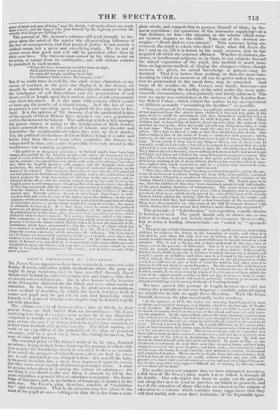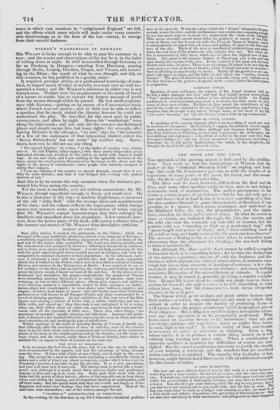GALL'S PIIILOsopit y or I:Due-AT/0N.
3Ia. Jams GALL appears to have been extensively connected with Sunday Schools, and other public institutions where the poor arc taught in large numbers ; and to have travelled through Great Britain and Ireland in order to examine into and improve this class of educational establishments. Ile is also known as the inventor of the 'Triangular Alphabet for the Blind, and some other works on education. In the volume bctbre us, he professes to promulgate a new method of teaching, by which the usual drudgery both of master and pupil may be got rid of, and that knowledge which tbrmerly took years of weariness to acquire may be learned rapidly and with pleasure. The volume consists of three sections: two of which, ill their present form, arc link better than till incumbrance—Mr. Gam, wandering into long iii iii upon points he is not altogether competent to handle, or who h have small rolvt4m to his main pur- pose, or into the proof 0.; things which he 'night have assumed, of at least have treated with greater brevity. The third section, de- voted to an exposition of the principles of IC: plan of practical education, and to It g(md unsay tuck illustrating its success, has more of value and interest. The essential point of Mr. GALL'S Method is, he says, founded on nature; being derived than (•bserving the manner in which chil- dren acquire the knowledge which is eselit s to them as animals. It we watch the progress of infitutile pereei.tiun, we find its at/un- lion is onlrattracted to one thing at it time: it is not till the baby, by frequent iteration, has a char idea impressed upon its senses, that they seem even callable of advancing to larger views. A simi- lar process takes place in learning the nature of substances : the one thing it call clutch is the one thing it attends to, till by fre- quent repetition a general idea of substance is acquired: the know- ledge of distances, and, to go further, of language, is learned in the same way. Mr. GALL's plan, therefore, consists of "individua- tion" and reiteration. That is, he presents very few ideas to the mind of the pupil at once—taking care that those few form a com-
plete whole, and compels him to possess himself of them, by fre- quent repetition ; the questions of the instructor supplying—at as vast distance, we fear—the stimulus to the scholar which natu- ral instinct imparts to the child. Take one of the shortest ex-
amples—" Jesus died to save sinners." This sentence being an- nounced, the pupil is asked, who died? then, what did Jesus die for ? and so on, till it is found, by his ready answers, that he has. acquired all which the sentence affirmed. Whether in abstract, ab- struse, or intellectual subjects, or, in short, in any subjects beyond' the actual experience of the pupil, this method is much more than an ingenious method of ringing the changes—where, though answers arc given, no actual knowledge is gained—may be doubted. That it is better than nothing, or than the mere rote- teaching in which no answers at all can be gotten unless the ques- tion be propounded in the usual form, may be conceded. And some of its results—in Mr. GALL'S own hands, however—are striking, as showing the docility of the mind under the most unfit- vonrable circumstances, when patiently and kindly addressed. The ease we quote was undertaken at the instance of the London Sun- day School Union ; which wished the author to try till experiment on children as nearly " resembling the heathen" as possible.
Two gentlemen of the Committee, accordingly, undertook the search, and at last procured from the streets three children, a boy and two girls, of the ages, so far as could be ascertained, (for they themselves could not tell,) of seven, nine, and eleven years, whom we shall designate C, II, and I. These children had no knowledge of letters; knew no more than the name of God, and that lie 1V118 in the skies, but could not tell any thing about him, or what he had done. They knew not who made the sun, nor the world, nor them- selves. They had no idea of a soul, or that they should live after death. One hail a confused idea of the name of Jesus, as connected with prayers ; which, however, slue did not understand, but had never heard of :Adam, Noah, or Abra- ham. When asked if they knew any thing of Moses, one of them is. I) instantly recollected the name ; hat when examined, it was found that she only referred to a cant term usually bestowed upon the old clothesmen of London. They hadno idea of a Saviour ; knew nothing of heaven or hell ; hail never heard. of Christ, and knew not whether the name 17elonged to it man or a woman. The boy, (II,) when strictly interrogated on this point. and asked whether he in- deed knew nothing at all of Jesus Christ, thinking his V(;'acity called in ques- tion, replied with much earnestness, and in a manner that showed the rude state of Lis mind, 'No ; upon my soul I do not.' " This class, after eleven days teaching, conducted in public, and in the pre- sence of numb era of teachers, during one hour daily, were publicly examined ill the Poultry Chapel by a ninnlier of elerg:. Wen betore the I 'ommittee of the Sunday Schur)] Union turd a numerous congregation. The :Report goes on to say, that the children of this class ' were examined, minutely told individually, on the great leading doctrines of Christianity. The enumerations and illus- trations of the several doctrines were given with a simplicity and in it language peculiarly their own ; which clearly proved the value of that part of the Lesson System which enjoins the dealing with the bless rather than the words ; and which showed that they had acquired a clear knowledge of the several truths. They were also examined on :,(1111e parts of the Old Testament history,' with which, during that short period, they had been made thoroughly acquainted."
The principle of "individuation" and repetition equally obtains in learning to read. The pupil should only be shown one or two letters at a time, and not merely made to recognize them readily, but to name a leading characteristic—as " round o," " spectacle ii g:T(I'l.e principle of individuation continues to be equally necessary in teaching children to combine the letters in the the:nation of words ; and when it is attended to, and when the only real use of letters, as the mere symbols of sound, is understood by the pupil, a smart child. In:1y be taught to read in a few minutes. This is not a theory, but a fact—evidenced in the experience of many, and in the presence of thousands. Nor is it necessary that the words which are taught should consist only of two or three letters: if the word be familiar to the child in speech, it becomes instantly known when divided and taught in parts or syllables; and when mute it is learned by the sounds of the letters, though these sounds merely approximate to the pronunciation of the word, it is sufficient to give a hint of what the word is, and when once it is known, it will not likely be again forgotten. By this means the child is never puzzled except by entirely new words; and by Knowing the use of the letters in (Itch sounds, he receives a key by Which at lew-t to guess at them, which the scow of the subject greatly assists; so that one day, ur even (mellow, is some- times, and we have no do;:ld will soon be generally, settle:cot to overcome the hitherto forbidding and harassing drudgery of learning to read."
We have quoted this passage at length, because we catild not convey the principle in our own language ; candidly acknowledging we should not be able to apply these directions. With Mr. GALL himself, however, the plan occasionally works wonders.
" In the summer of IF the writer one morning found himself, by mete accident, and a perfect Stranger, 111 a Sunday school in the borough of South- wark, London. lie attached himself first to a class of children, some of whom he found on inquiry had been two years at the school, and were yet only learn- ing the alphabet. In the same school, and mi the same morning, a young man »In) only knew his letters, but hail never yet aitemptial to put them together, was elassilied with the inffints, whom lie had willingly joined iu his anxiety to harm Ile had a lesson by himself. Ilya rigid adherence to the above prin- ciple of individuation, this young man, to his own great astenishment, was able in a fetv minutes to read a verse. The lesson went on, :aid in somewhat less than half an hour he had mastered several verses, and now knew perfectly how to make use of the letters in deciphering the several words. By that one lesson he found himself quite able to teach himself: In proof of this, is was afterwards ascertained, he read that saine.day, On going home, withont help, nineteen verses of the same chapter ; and these verses, on ref inning to school on the swine afternoon, Ile read correctly, and without 1:( :it:ohm, to his usual and ostoni,:laai teacher. There can be no doubt, front this circumstance, that, if it had been at all necessary, be could, without further aid, and with still greater case, have read a second nineteen verses, and perfected himself By prac- tice. in this important and supposed difficult art of reading, by this one lesson of less than half an hour."
The reader must not suppose that we have attempted to convey a full idea of Mr. GALL'S plan, much less to fbllow it through all its details. Our sole object has been to point out the principle, not altogether new at least ill practice, on which he proceeds, and to call the attention of those who take an interest in the subject of Ieducation to a volume which contains many suggestions that they will fled useful, and some facts indicative of the deplorable igno-
rance in which vast numbers in " enlightened England " are left, and the efforts which many minds will make under every conceiv- able disadvantage, as in the hero of the last extract, to emerge from their mental darkness.



























 Previous page
Previous page